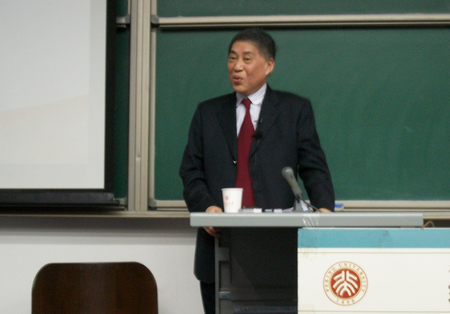Peking University, Apr. 10, 2011: Renowned Taiwanese writer Pai Hsien-yung (Bai Xianyong), initiator of the “relish in Kunqu Opera” lectures and self-recognized “volunteer for Kunqu Opera”, delivered his speech at PKU on March 31.
Beginning with contemporary adaptations of The Peony Pavilion and The Jade Hairpin, Pai analyzed the relationship between classical aesthetics and modern ideology. He emphasized that the corporation between Taiwan and mainland China in the popularization of Kunqu should be reinforced, because “Taiwan has an outstanding audience, whereas the mainland has outstanding performers”.
On the evening of April 1, Pai Hsien-yung was interviewed by PKU News (Chinese) during which he shared his experience of Kunqu.

In 1945, nine-year-old Pai lived in Shanghai. He fell in love one day with a classic rendition of The Peony Pavilion performed by Mei Lanfang and Yu Zhenfei. “Though I, as a child, understood little of the episode, I was left with a deep impression.” Kunqu was thereafter lodged in little Pai Hsien-yung's heart. Fifteen years later, Pai finished a novel, titled the same as an episode he saw in 1945 - “Romantic Dream in the Garden”. Pai said that Kunqu inspired his composition of that novel.
In 1987, Pai returned to Shanghai. “The Palace of Eternal Youth” by Shanghai Kunqu Troupe evoked his dream of Kunqu. Although there were several opera troupes in Taiwan, Pai had few opportunities to get exposed to Kunqu. Therefore, his passion for Kunqu was too strong to be repressed once evoked. In the same year, Pai watched the “The Peony Pavilion” performed by Zhang Jiqing, which once again closely bonded Pai with Kunqu.
Kunqu, the “national opera” from late Ming Dynasty to late Qing Dynasty, is on the wane at present. Aware of this trend, Pai Hsien-yung became a self-termed “Kunqu Volunteer”, out of love for Kunqu and of responsibilities with regards to passing on Chinese traditional culture,. “Kunqu is the pursuit of my life”, says Pai.
Pai hit upon the idea of re-writing “The Peony Pavilion” in 2003. In Taiwan, he had, as early as 1983, participated in the production of two episodes of “The Peony Pavilion”. Later he came to know Suzhou Kunqu Opera Theatre’s two excellent young performers—Yu Jiulin and Shen Fengying, who play Liu Mengmei and Du Liniang respectively in “The Peony Pavilion – Young Lovers’ Edition”. Through careful preparation and adaptation, “The Peony Pavilion – Young Lovers’ Edition” eventually came into being.
In 2004, the Young Lovers’ Edition premiered in Taipei with a great sensation. This edition has been performed 188 times across Mainland, Taiwan, Hong Kong and Macao. At Peking University, tickets of three performances of the Young Lovers’ Edition sold out.
“The main goal and effect of this Young Lovers’ Edition is tugging at young audience members’ hearts,” Pai said. To his credit, it is the beauty of the play that is the main reason for its success: the play is of high aesthetic value, with a good script, and is produced beautifully. To Pai, "the art of performance should reflect the contemporary aesthetic characteristics." And this version is, for Pai, consistent with modern aesthetics. The second reason the play is so successful is that it moves the audience through a series of emotional moves. When the play was performed abroad, Pai was greatly impressed by reactions expressed by overseas Chinese students. “Their tears were rich in meaning. On the one hand, they were brought on by the moving script, and on the other, by a deep attachment to their nation seeing their own national play earn admiration abroad from a foreign audience.”
However, does this version cater only to the modern aesthete at the cost of losing its classical tradition? In response to such questions, Pai stressed his principle - respecting Classics but not copying them, making use of modern elements but not abusing them". Pai is not in favor of an overhaul of Kunqu. What he wants is the incorporation of modern elements into a traditional art form.
In December, 2009, Pai cooporated with PKU to launch the Kunqu heritage program. The first phase, which was to take five years, involved arranging several elective courses at PKU, holding “Kunqu Weeks”, organizing exhibitions for outstanding Kun Operas, promoting the digital Kunqu project, establishing a union of one hundred famous Kunqu performers, and creating the Kunqu Heritage Foundation.
Pai said that he hoped universities could revive education regarding traditional culture to push students closer to and allow them to further explore the beauty of traditional culture. The success of "The Peony Pavilion – Young Lovers’ Edition" led him to realize a thirst for cultural identity in the young generation. Kunqu, as a combination of literature, music, art, dance, drama, and integrated arts, is rich in aesthetic value and thus can servethe this end.
Pai repeatedly stressed,"university education is not just vocational training, but it should help shape a student's entire personality." University education lacked aesthetic education and personality development in his view. Weighed down by the pressure to perform in school, students have not time to appreciate the beauty of art which he considers extremely important. "Aesthetic understanding can teach you the beauty of life—one is visual beauty, and the other is beauty of the heart."
Edited by: Zhang Chunlan
Written by: Liu Lu
Source: PKU News Chinese)